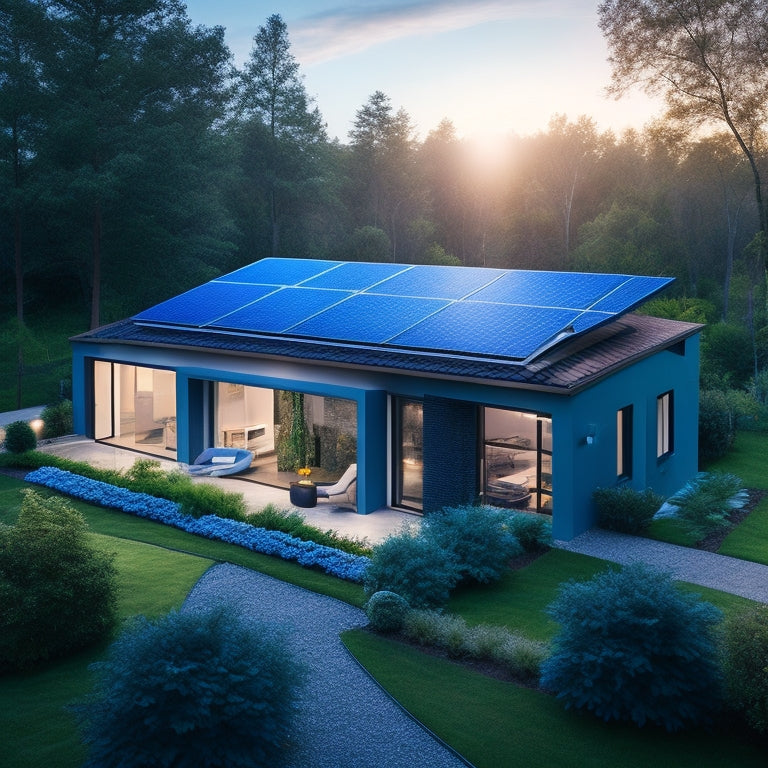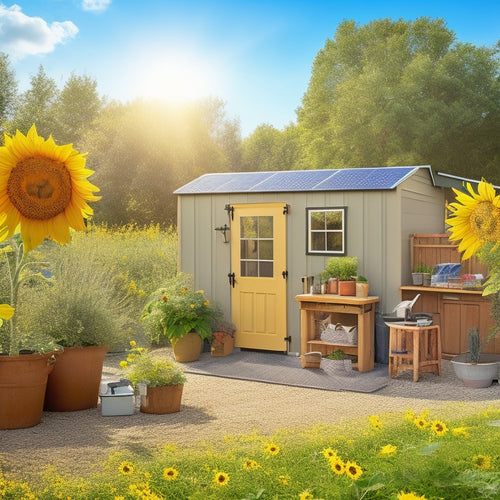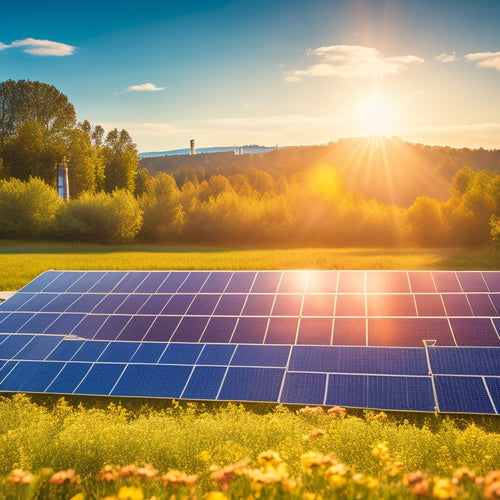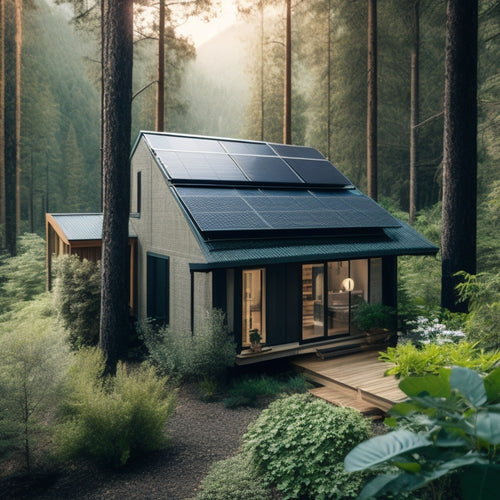
Top Inverter Systems for Home Energy Independence
Share
You're looking for top inverter systems to achieve energy independence at home. Start by selecting top-rated models from reputable manufacturers, ensuring high reliability and energy monitoring capabilities. Efficient energy conversion is key, so optimize power output and energy storage. For solar power, look for high-efficiency inverters with robust surge protection, grid synchronization, and advanced features like power optimization algorithms. By choosing the right inverter, you'll minimize energy losses and maximize your renewable energy returns. Now, discover the best systems and features that'll take your energy independence to the next level.
Key Takeaways
• Choose top-rated inverter models from reputable manufacturers for high reliability and efficient energy conversion.
• Opt for inverters with high efficiency ratings (95% or higher) to minimize energy losses and maximize renewable energy returns.
• Consider inverters with advanced features like energy monitoring, power optimization algorithms, and surge protection for enhanced performance.
• Select the right inverter size by performing load calculations, evaluating peak power demand, and determining average energy usage.
• Regularly maintain your inverter system through daily checkups and inspections to ensure peak performance and prolong system lifespan.
Top-Rated Inverters for Home Use
When selecting an inverter for home use, take into account the top-rated models from reputable manufacturers that have proven track records of reliability, efficiency, and durability. You'll want an inverter that can withstand the rigors of daily use and provide consistent energy output.
Look for models with high inverter reliability ratings, as this will guarantee your system runs smoothly and efficiently.
Energy monitoring is another important aspect to take into account. You'll want to be able to track your energy production and consumption in real-time, making adjustments as needed.
Top-rated inverters often come equipped with advanced monitoring capabilities, providing you with detailed insights into your energy usage. This feature enables you to optimize your energy production, reducing waste and saving you money on your utility bills.
Efficient Energy Conversion Systems
You'll need an efficient energy conversion system to guarantee maximum energy harvesting and minimal loss during transmission, which is where a high-quality inverter plays a vital role. This is essential for achieving home energy independence. A reliable inverter ensures that the energy generated from your solar panels or wind turbines is converted into usable electricity for your home.
Efficient energy conversion systems optimize power output, reducing energy losses and increasing overall system efficiency. This is achieved through advanced power electronics and sophisticated control systems.
For instance, some inverters integrate Energy Storage systems, enabling you to store excess energy for later use. This feature ensures a stable and reliable power supply, even during periods of low energy production. Additionally, advanced Power Optimization algorithms can detect and adapt to changes in energy demand, further enhancing system efficiency.
Solar Power Inverter Features
When selecting a solar power inverter, you'll want to consider several key features that impact its performance and reliability.
First, look for high power conversion efficiency to minimize energy losses and maximize your solar panel's output.
You'll also want to consider that your inverter has robust surge protection capability and can operate in grid synchronization mode for seamless integration with the grid.
Power Conversion Efficiency
Maximizing power conversion efficiency is essential in solar power inverters, as it directly impacts the amount of usable energy your system can harness from the sun. When it comes to energy harvesting, every percentage point counts. A high-quality inverter guarantees that you're getting the most out of your solar panels, reducing energy waste and increasing your overall energy independence.
In a DC-AC conversion process, efficiency losses can occur due to heat, electrical resistance, and other factors. However, premium inverters are designed to minimize these losses, achieving efficiencies of 95% or higher. This means that for every unit of DC power generated by your solar panels, the inverter can convert a significant portion of it into usable AC power for your home.
When evaluating inverter systems, look for models with high efficiency ratings, typically denoted by a high peak efficiency (PE) or European efficiency (EE) percentage. A higher efficiency rating translates to more usable energy for your home, reducing your reliance on the grid and maximizing your energy independence.
Surge Protection Capability
To guarantee a reliable solar power inverter's surge protection capability safeguards your system from voltage spikes, electromagnetic pulses, and other power grid disturbances that can damage your equipment and disrupt your energy independence. As you consider your inverter options, understanding the importance of surge protection in ensuring power quality is crucial. A good surge protector acts as a lightning rod, diverting excess energy away from your system.
Here's a comparison of some top inverter systems' surge protection capabilities:
| Inverter System | Surge Protection Rating | Response Time |
|---|---|---|
| SMA Sunny Island | 6 kV | 1 ns |
| Schneider Electric Conext | 4 kV | 2 ns |
| Enphase Ensemble | 3 kV | 5 ns |
| Fronius Symo | 5 kV | 1.5 ns |
When evaluating surge protection, look for inverters with high voltage ratings and fast response times. This ensures that your system can withstand power grid disturbances and maintain a high level of power quality. By prioritizing surge protection, you can enjoy uninterrupted energy independence and protect your investment.
Grid Synchronization Mode
When you guarantee your inverter system can withstand power grid disturbances, you'll want to contemplate its ability to synchronize with the grid, which is where grid synchronization mode comes into play. This feature guarantees that your inverter system can seamlessly integrate with the grid, providing a stable and efficient energy supply.
Grid synchronization mode is vital for maintaining grid stability and frequency regulation. Here are three key benefits of this feature:
-
Critical grid stability: Grid synchronization mode ensures that your inverter system can adapt to grid fluctuations, preventing instability and power outages.
-
Effective energy distribution: By synchronizing with the grid, your inverter system can optimize energy distribution, reducing energy waste and increasing overall efficiency.
-
Frequency control: This feature ensures that your inverter system can regulate frequency deviations, maintaining a stable and reliable energy supply.
With grid synchronization mode, you can rest assured that your inverter system is equipped to handle the demands of the grid, providing a reliable and efficient energy supply for your home.
Inverter Systems for Off-Grid Homes
As you consider inverter systems for your off-grid home, you're likely motivated by the benefits of grid independence - namely, reducing your reliance on public utilities and minimizing your environmental footprint.
To achieve this independence, you'll need to design a system that can efficiently manage your energy needs, which involves careful consideration of your power requirements and energy storage needs.
Grid Independence Benefits
By going off the grid with an inverter system, you'll enjoy unprecedented freedom from utility companies and a reduced reliance on fossil fuels. This means you'll have more control over your energy usage and costs, and a smaller carbon footprint to boot.
Here are just a few benefits you can expect from grid independence:
-
Energy Security: With an inverter system, you'll have a reliable source of energy, even during outages or natural disasters.
-
Reduced Reliance: You'll reduce your reliance on the grid, which means lower energy bills and a smaller environmental impact.
-
Increased Autonomy: You'll have the freedom to live life on your own terms, without being tied to the grid.
System Design Considerations
Designing an inverter system for off-grid homes requires careful consideration of several key factors to guarantee a reliable, efficient, and safe power supply that meets your specific energy needs. As you begin this process, conducting a thorough load analysis is crucial to determine your energy requirements. This involves calculating the total power consumption of your appliances, lighting, and other electrical devices.
You'll need to identify the maximum power demand and the total energy consumption in watt-hours (Wh) per day. Next, you'll need to select the right inverter and battery bank to meet your energy needs. Cable sizing is crucial to ensure safe and efficient energy transmission. You'll need to choose cables that can handle the maximum current output of your inverter and battery bank.
Additionally, you'll need to take into account the voltage drop, temperature rating, and insulation type to make sure the cables can withstand the demands of your off-grid system. By carefully evaluating these factors, you can create a reliable and efficient inverter system that provides the energy independence you desire.
Benefits of Grid-Tie Inverters
Grid-tie inverters offer you a seamless way to sell excess energy back to the grid, providing a revenue stream that can greatly offset your electricity bills. This means you can enjoy significant savings on your energy costs, while also contributing to a more sustainable future.
With a grid-tie inverter, you can:
-
Maximize Energy Harvesting: Generate more power during the day and sell it back to the grid, reducing your reliance on non-renewable energy sources.
-
Enhance Energy Security: Store excess energy in the grid, ensuring a stable and reliable supply of power when you need it most.
-
Accelerate a Renewable Future: Contribute to a cleaner, more sustainable energy landscape, paving the way for a renewable-powered tomorrow.
High-Efficiency Inverter Options
You can further optimize your energy independence by selecting high-efficiency inverter options that minimize energy losses and maximize your renewable energy returns. When it comes to energy harvesting, every watt counts, and high-efficiency inverters can make a significant difference. Look for inverters with high conversion efficiency ratings, typically above 95%, to make sure you're getting the most out of your renewable energy source.
Inverter reliability is also essential, as it directly impacts your energy independence. A dependable inverter ensures consistent energy harvesting and reduces the risk of downtime. Opt for inverters with a proven track record of reliability, supported by thorough warranties and dedicated customer support.
When evaluating high-efficiency inverter options, consider the maximum power point tracking (MPPT) efficiency, which measures the inverter's ability to optimize energy harvesting. Additionally, look for inverters with advanced features like monitoring and control systems, which enable real-time performance tracking and remote troubleshooting.
Choosing the Right Inverter Size
Selecting an inverter that's properly sized for your renewable energy system is crucial, as it directly impacts the overall performance and efficiency of your energy harvesting setup. A correctly sized inverter guarantees that your system operates within its peak range, maximizing energy production and reducing wear and tear on components.
To choose the right inverter size, you'll need to perform load calculations and conduct an energy audit to determine your energy requirements. This involves evaluating your home's energy usage patterns, including the type and number of appliances, lighting, and HVAC systems.
Here are three key considerations to keep in mind when selecting an inverter:
-
Peak power demand: Calculate the maximum power required by your appliances and systems during peak usage hours.
-
Average energy usage: Determine your daily energy consumption to ensure the inverter can meet your overall energy needs.
-
System expansion: Consider your plans for future system expansion or upgrades, and choose an inverter that can accommodate increased energy demands.
Inverter System Maintenance Tips
Consistently inspecting and maintaining your inverter system guarantees peak performance, prevents unexpected downtime, and prolongs its lifespan. By doing so, you'll ensure your system runs efficiently, saving you time and money in the long run.
To maintain your inverter system, perform daily checkups to identify potential issues before they escalate. Check the system's temperature, voltage, and current output to make sure they're within the recommended ranges.
Regularly inspect the system's components, such as cables, connectors, and fuses, for signs of wear or damage. Importance detection is vital in preventing system failures. Implement a fault detection system that alerts you to any issues, allowing you to take prompt corrective action.
Additionally, keep your system's software up-to-date, as newer versions often include bug fixes and performance enhancements. By following these maintenance tips, you'll enjoy a reliable, efficient, and long-lasting inverter system that supports your energy independence goals.
Frequently Asked Questions
Can I Use a Single Inverter for Multiple Solar Panels?
You can connect multiple solar panels to a single inverter, but make sure the inverter's capacity matches the total panel configuration's maximum power output, and consider the inverter's maximum voltage and current ratings to avoid overload.
How Often Should I Replace My Inverter's Electrical Components?
As you navigate the complex world of inverter maintenance, you're wise to wonder about the lifespan of those electrical components. Typically, you'll need to replace them every 5-10 years, but this can vary depending on usage and quality.
Do I Need a Backup Generator With an Off-Grid Inverter System?
When you're considering an off-grid inverter system, you'll need a backup generator to guarantee continuous power supply during grid failures, providing you with reliable backup power and energy independence.
Can I Install an Inverter System Myself, or Do I Need a Professional?
As you start on a DIY adventure, maneuvering the intricate inverter system landscape, remember, DIY safety is vital, but Professional Certification guarantees a safe, efficient setup; don't risk electrical shock, consult an expert to avoid a 'shocking' experience.
Are Inverter Systems Compatible With Energy Storage Systems Like Batteries?
You'll be pleased to know that inverter systems are designed for seamless battery integration, enabling energy synergy between your renewable energy source and energy storage system, ensuring a reliable and efficient home energy setup.
Related Posts
-

Building an Emergency Backup Solar Power System in 5 Essential Steps
Building an emergency backup solar power system involves five key steps. First, assess your daily energy needs to ide...
-

Advantages of Solar Generating Systems Over Traditional Energy
Solar generating systems provide several key advantages over traditional energy sources. You'll experience lower long...
-

Off Grid Solar Batteries
As you shift to off-grid living, you'll rely on high-performance solar batteries to store excess energy generated by ...


